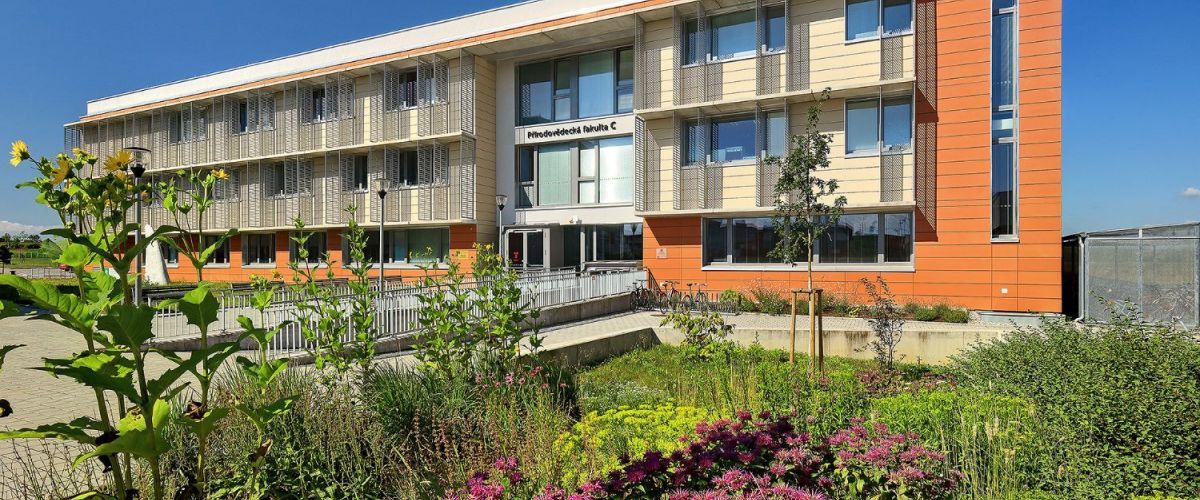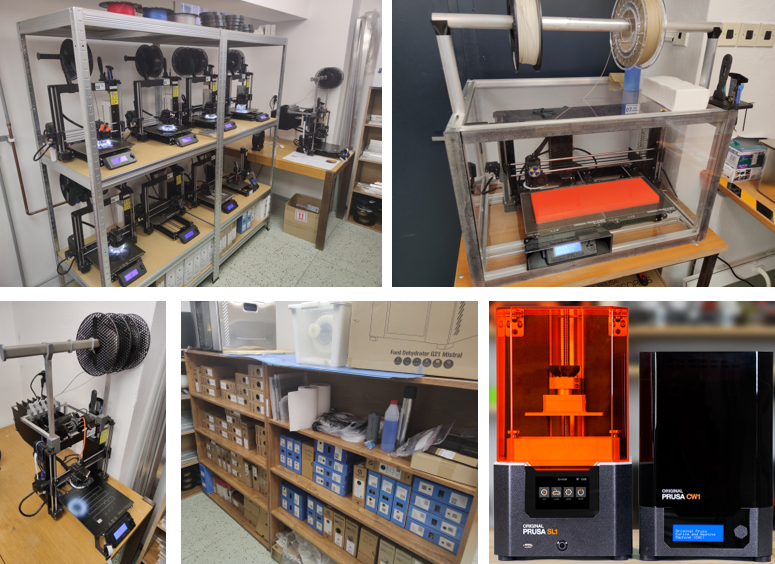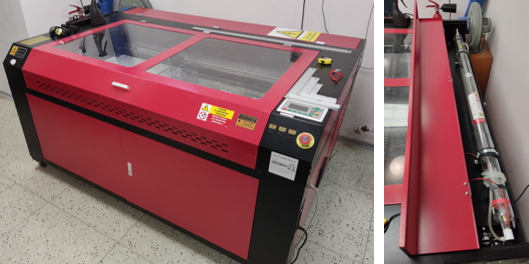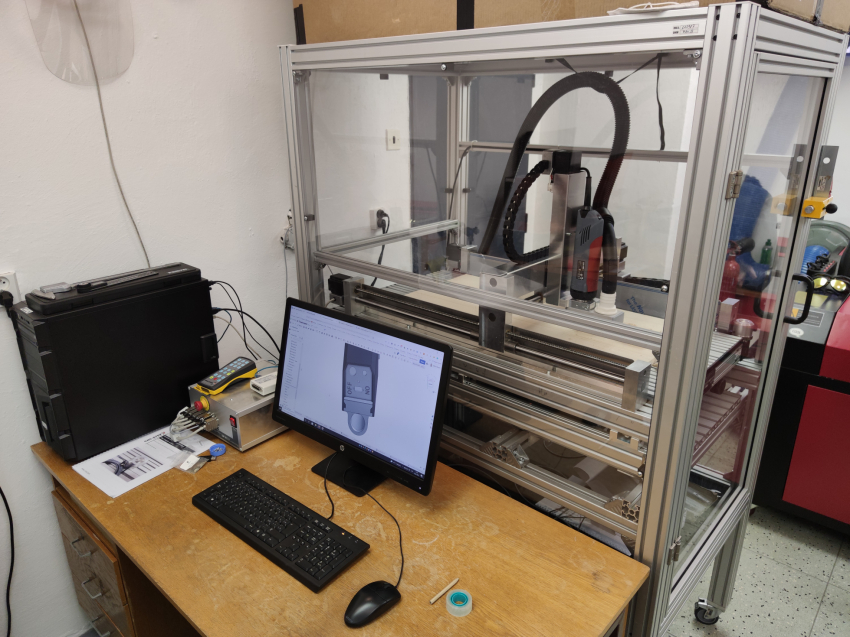
Department of Computer Science
Labs
There are a total of 6 laboratories in our department. These are advanced research facilities. Here you will find the 3D Modeling and Additive Manufacturing Laboratory, the Communication Systems and IoT Laboratory, the Embedded Systems and UAV Laboratory, the Artificial Intelligence Laboratory (AI Lab), the Applied Development and Research Laboratory, and the Bioinformatics Laboratory.
The 3D modelling and additive manufacturing laboratory is closely linked to the embedded systems and UAV laboratory. The main focus of the laboratory is to support the activities and projects of the Faculty, the University and the Biological Centre of the Academy of Sciences. We specialize in prototype design and fabrication, technology and materials research. We carry out the creation of complex 3D models, their analysis and optimization.
Lab members:
Mgr. Geyer Jakub
PhDr. Milan Novák, Ph.D.
Technology
The primary technology of the 3D modelling and additive manufacturing laboratory is 3D printing. We focus mainly to printers from the Czech manufacturer Prusa Research in the areas of FFF (fused filament fabrication) and SLA (stereolithography). We have our own modifications of these printers, e.g. Prusa i3 MK3 with double printing area or modified Prusa MMU2 (multi-material upgrade). Thanks to this we are able to print not only from common materials (e.g. PET, PLA, ABS) but also from filaments with additives (e.g. wood, carbon fiber, etc.) or more demanding materials (nylon, polycarbonate, flexible TPE/TPU, etc.) and using soluble supports. For example, we often print from PET-G with carbon fibre, FRJet (PET-G with flame retardant - flame retardant) and HT-CPE. On SLA printers, we create highly detailed parts on which we can realize specific properties (heat resistance, desired flexibility, etc.) thanks to mixing resins.
3D printing (additive manufacturing process) can also be conveniently combined with subtractive manufacturing processes (CNC, laser cutting, etc.) to realize complex prototypes.

The large-format CO2 Laser (XM1490) enables precise cutting of materials such as polycarbonate, PET or wood. It also enables engraving of these materials and glass; or, with the use of special varnishes, permanent marking/describing of metals.
Power: 150W, Max. material width: 140cm

CNC milling machine (High-Z S-720/T) is used for precision machining of plastic, metal or wooden parts. It is also suitable for modification of already existing parts (drilling holes, milling pockets, etc.).
Max. area 70x40x15cm.

Software overview
OnShape, Fusion360, SolidWorks, FreeCAD, Blender, SketchUp, PrusaSlicer, Cura, Simplify3D, Meshmixer, OctoPrint, Meshroom, VXelements, ConstruCAM, WinPC-NC, LightBurn, a další
Publications and outputs
Publications
Novák M., Geyer J., et al. (2021) Construction of a Multisensor UAV System for Early Detection of Forest Pests. In: Shakhovska N., Medykovskyy M.O. (eds) Advances in Intelligent Systems and Computing V. CSIT 2020. Advances in Intelligent Systems and Computing, vol 1293. Springer, Cham. https://doi.org/10.1007/978-3-030-63270-0_78
Příručka 3D modelování a tisk pro SŠ a příručka 3D modelování a tisk pro ZŠ, Impuls pro kariéru, 2021
Patents, utility models
Patent: Digital remote control of analog potentiometers for guitar amplifier (EP 19160447.9, 2021), Ptáček L., Novák M.
Užitný vzor: Systém ke sledování kůrovcových aktivit (U1: 35641, 2021), Novák M., Ptáček L., Doležal P., Geyer J., Davídková M.
Final Thesis
Beránek Karel, Modifikace 3D tiskárny Prusa i3 MK3 na uzavřený koncept s dvojnásobnou tiskovou plochou
Čechová Jana, Tvorba 3D modelů existujících budov
Scholz Luděk, Systém pro řízení chytré domácnosti
Švarc Jakub, Konstrukce a řízení kolového robotického prostředku (probíhající)
Trtílek Ondřej, Konstrukce robotické ruky pro mobilní podvozek (probíhající)
The laboratory provides facilities for projects focused on embedded systems, electronics, robotics, and unmanned systems. The laboratory participates in the development of specific systems for sub-projects in cooperation with other parts of the Faculty of Science. These are mainly sensor systems for unmanned vehicles, control and automation systems, etc.
The Embedded Systems and UAV Laboratory has several unmanned machines:
- DJI Matrice 600Pro
- DJI S1000
- DJI Phantom 4 Adv
In addition to these machines, which are used to acquire mostly environmental data, we are developing our own UAVs for special applications using Pixhawk autopilots.
We use the CrazyFlie platform for algorithm testing and teaching.
Unmanned vehicles are carriers for sensors that are used depending on data acquisition needs: The most common are WIRIS 2gn thermal cameras, WIRIS PRO, spectral and hyperspectral cameras or specific sensors.
To develop specific devices such as sensor networks, electronic components or sensors for UAVs are available in the laboratory:
- Oscilloscopes.
- Spectrum analyzer.
- Generators.
- Soldering stations.
- CNC milling machine LPKF E44 for PCB production.
- And everything needed to work with processors to create prototype devices.
The laboratory also has an experimental photovoltaic power plant for testing electronics for active cooling of FVP, etc.
The team deals with the design, simulation, measurement and management of simple as well as complex network infrastructures, including transmission systems. This includes both wired, primarily optical, and wireless transmission technologies. The team also addresses sensor systems and collaborates in data acquisition and analysis with the Information Theory and Learning Systems team and in design and hardware with the Embedded Systems and Additive Manufacturing team. The team operates a laboratory Communication systems and IoT.
Team Leader:
Examples of projects:
SmartGrid – Chytré sítě ve venkovských oblastech a MSP, projekt č. 144, přeshraniční spolupráce Česká republika - Svobodný stát Bavorsko Cíl EÚS 2014 – 2020. Více na: http://smartgrid.science/
ELIXIR CZ – Česká národní infrastruktura pro biologická data, projekt velké výzkumné infrastruktury, ID LM2015047 + LM2018131. Řešení společně s týmem Bioinformatiky. Více na: https://elixir-czech.cz/










